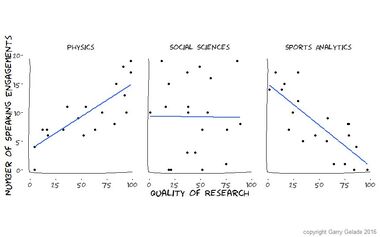The following content presents raw ideas. This page needs massive edits. Do not quote this material in any source. It is not sanctioned in any way. Rather, this page is more of a place holder for more editing to come.
XP Template for LRNG entry[]
Title[]
- XP/Open Source Sports
Banner[]
Description[]
edit me
Resources (optinal)[]
Are there any resources that would help learners complete this XP?
- http://aforathlete.wikia.com/wiki/File:Creative_Commons_Mixed_Tape
- Mixed Tape video from Creative Commons.
-
Submission Requirements[]
Describe the evidence a learner must submit to complete this XP.
edit me
Learning Details[]
Set the Interest, Age, Participation, and Duration of your XP.
- Interest
- Age Appropriateness
- LRNG LVL
- Estimated Duration
- hr
- min
Topics[]
- Creative Commons
- Sports Licenses
- Free Software Foundation
- March Madness
- Sports analytics
- Make a sports topic WordPress web site hosted at Pair.com.
- Peek into the union of WordPress and LiveCode. See https://livecode.com/a-gift-from-the-community-for-the-community/

Part of the problem. Skeptical. From a tweet.
Links[]
Good Articles[]
- MagPi (magazine), issue 43, has a good feature article, called Free to Share, on page 70. https://www.raspberrypi.org/magpi-issues/MagPi43.pdf
Source for Content[]
Insights[]
Open Education with Blockchain[]
Open-source educational content within a blockchain vision provides a rich, secure, and transparent platform on which to create such a global network for higher learning.
The global network for higher learning is not a pipe dream. Leading scholars know that higher education institutions and their faculties cannot continue to operate as islands, constantly reinventing the lecture.
Three stages.[]
- content exchange. Professors share ideas and upload their teaching materials to the Internet for others to use freely.
- content co-innovation, where teachers collaborate across institutional and disciplinary boundaries to co-create new teaching materials using wikis and other tools.
- the college or university has become a node in the global network of faculty, students, and institutions learning collaboratively. It still maintains its identity, campus, and brand.
Richard G's thoughts[]
Pick your license carefully - you should ALWAYS read the fine print.
Richard G posted that he prefer Ludwig Mies van der Rohe's variant, "God is in the details."
Neither the invention of the GPL nor its selection among those who use it is in any way accidental.
The LiveCode community is comprised mostly of people who have decades of experience using and building exclusively proprietary software.
In our milieu, the "free" in "free software" is often seen with a focus on price. But it's important to remember that the GPL expresses no opinion about price at all.
This is a limitation of English, in which "free" refers to both "gratis" and "libre".
With "free software", the "free" is about "libre", or "freedom", the explicit freedoms granted in the license to receive source code, to be able to study it, to modify it, and to share those modifications with your neighbor.
There are many open source licenses. While the GPL and its derivatives are the most popular, there's also the Apache License, Mozilla License, Python's and PHP's unique licenses, and many others. There's even a WTFPL (see <http://www.wtfpl.net/faq/>, though be forewarned about the language you'll find there <g>).
There are almost as many different open source licenses as there are proprietary ones. And like proprietary licenses, each has its own unique terms and conditions.
One of the reasons the GPL has remained so popular with so many projects is because of the values it represents. When your goal is sharing, the GPL can be a very good choice because it ensures the sharing will continue downstream, that no one can hoard the code released under it.
If that reflects your own values and your goals for a project, the GPL is a widely accepted solution to make that happen for you.
But as mostly proprietary-only developers, many in our community view the value of code with different goals, mostly monetary and often specifically with revenues derived from per-user licensing, which requires the code remain concealed from the recipient of the software.
In my own view, I see no harm in either approach. Both have a useful place. But they do represent different models of how value is derived. While relatively few here see sharing source code as more valuable than being paid to keep it secret, there are large numbers of developers in other corners of the world with different goals, where the value of community contributions outweighs potential license fees.
It may be tempting for those who work exclusively in proprietary software to dismiss the GPL as idealistic, just as some free software advocates dismiss proprietary software as user-hostile in preventing users from fixing bugs or adding features they need.
Personally, I see the GPL as a very pragmatic solution when the goal is proliferation. By ensuring downstream enhancements are shared with the world community, a software released under GPL can only become ever more capable.
Consider the Internet that deliver this post to you. Much of the 'Net's infrastructure is run on truly free software, and most of the routers, switches, and servers are running Linux. Linux is also at the heart of 80% of smartphones, 65% of tablets, most embedded devices, and 95% of the world's supercomputers. While Windows continues to dominate the desktop, every other form of computing today is largely a Linux story.
This would not likely have been possible without the GPL. But by ensuring that any modifications of the software get shared back to the community they came from, Linux has become adapted for a much broader range of use cases than any other OS.
We can hope that over time we'll see similar community-driven enhancement with LiveCode. And now that v8 is here with Builder, at last we have a scriptable interface to OS APIs and object definitions (Widgets). So going forward enhancing the LiveCode experience is no longer limited to those proficient in C++. Anyone who can script can extend, modify, and share.
And as a dual-licensed system, LiveCode lets us choose either GPL or other licenses depending on our goals for the project at hand.

